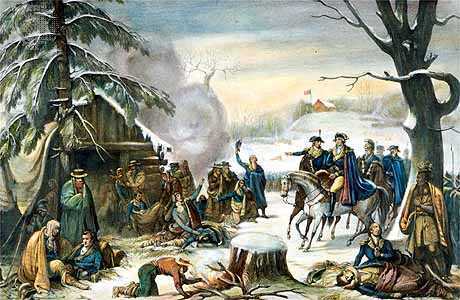The winter of 1777-8 was the low purpose of America's battle for freedom. The inconveniences started the past August when the British armada emptied a power of Redcoats at the highest point of the Chesapeake Bay with the goal of catching the American capital at Philadelphia. The Americans were steered by the British at the Battle of Brandywine on September 11, leaving Philadelphia undefended.

The Continental Army endured another annihilation at the Battle of Germantown only north of Philadelphia on Oct. 4. General Washington drove his fatigued and unsettled armed force to Valley Forge a couple of miles away where they would camp for the winter and get ready for the fight to come with the arrival of warm climate.
Conditions in the camp were appalling. Compelled to live in clammy, swarmed quarters, Washington's armed force of roughly 12,000 experienced an absence of sufficient attire and nourishment. Illnesses, for example, typhoid, looseness of the bowels, typhus and pneumonia ran widespread. An expected 2,000 kicked the bucket. Spirit dove.
General Washington was in give up as he watched his armed force break down. In any case, as time advanced, a change happened. Under Washington's propelled administration, conditions enhanced: more nourishment, gear and newcomers achieved the camp lifting spirits. In particular, the preparation endeavors of Baron von Steuben expanded train and revived pride among the troops. A previous individual from the General Staff of the Prussian Army, Steuben touched base in camp in February bearing a letter of presentation from Benjamin Franklin whom he had met in Paris.
Out of this frightful winter rose another Army, certain and prepared to do fight. On June 19, 1778 the British deserted Philadelphia and walked back to New York City. Washington drove his Continental Army in interest. The resulting fight at Monmouth, New Jersey finished in a draw. The War for Independence would last an additional five years, yet a noteworthy triumph of the soul had been won amid the winter at Valley Forge.
Before long I came in sight of the camp. My creative ability had imagined an armed force with garbs, the sparkle of arms, gauges, and so forth., so, military pageantry of assorted types; Instead of the forcing display I expected, I saw, assembled together or remaining solitary, a couple of minute men, ineffectively clad, and generally without shoes - a significant number of them seriously furnished, however all very much provided with arrangements, and I saw that tea and sugar framed piece of their apportions. I didn't then realize this was not bizarre, and I chuckled, for it influenced me to think about the enlisting sergeants on the Quai de la Ferraille at Paris, who say to the country folks, 'You will need to no end when you are in the regiment, yet in the event that bread should run short you should wouldn't fret eating cakes.' Here the officers had tea and sugar.
Such, in strict truth, was, at the time I came among them, the presence of this outfitted horde, the pioneer of whom was the man who has rendered the name of Washington well known; such were the settlers - untalented warriors who learned in a couple of years how to overcome the finest troops that England could send against them. Such additionally, toward the start of the War of Independence, was the condition of need in the radical armed force, and such was the shortage of
cash, and the neediness of that administration, now so rich, intense, and prosperous, that its notes, called Continental paper cash, were almost valueless. "